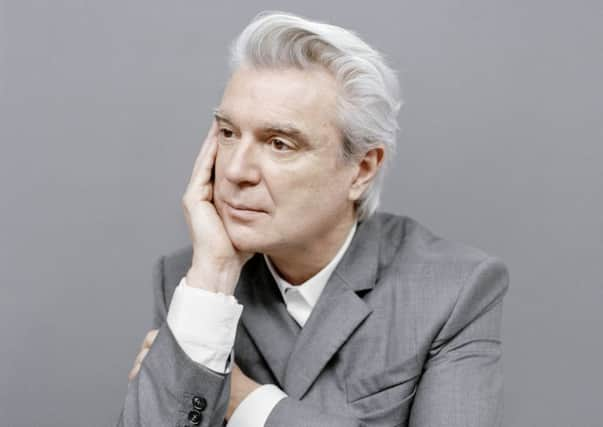Album reviews: David Byrne | Jimi Hendrix | Albert Hammond Jr


David Byrne: American Utopia (Todomundo/Nonesuch) ****
Jimi Hendrix: Both Sides of the Sky (Experience Hendrix/Sony Legacy) ***
Albert Hammond Jr: Francis Trouble (Red Bull Records) ****
Fresh from writing a musical about Imelda Marcos (with Fatboy Slim), and another musical about Joan of Arc, and touring with St Vincent and a brass band, and writing a book about how music works, David Byrne settles into his first solo album since 2004.
Advertisement
Hide AdAmerican Utopia is part of a wider project of pragmatic optimism which Byrne has titled “Reasons to be Cheerful” – not so much a bullish or Pollyanna-esque response to the erosion of the utopian dream on which the US was founded, more a refusal to fall into the slough of despond now that, in his words, “the experiment seems on the verge of complete and utter collapse”.
Byrne is possibly aware that the very fact of his return to the pop frontline is reason enough for many to be cheerful but should the casual listener need persuading, be assured that American Utopia is a work of infinite good humour.
Opening gambit I Dance Like This oscillates between whimsical piano ballad and industrial intoning, Every Day Is A Miracle is a sort of singalong number which posits that “God is a very old rooster” and, along its smart and merry way, there are philosophical musings on our dog-like natures, the classy cocktail pop of Doing the Right Thing, the far eastern chimes of the cool, meditative This Is That and some flinty Latin-flavoured funk on It’s Not Dark Up Here, which asks questions like “Must a question have an answer? Can’t there be another way?”
To pose an additional question on encountering the catchy rhythmic quirks of Brian Eno co-write Everybody’s Coming To My House – on this fluent, infectious form, why wouldn’t they?
Both Sides of the Sky is the third in a trilogy of posthumous Jimi Hendrix albums, made up of mostly previously unreleased material recorded between 1968 and 1970, with an emphasis on the blues repertoire which Hendrix turned on its head on his original album releases.
With his two blistering power trios, the Jimi Hendrix Experience and Band of Gypsys, the incomparable guitar stylist turns in a turbo-charged Mannish Boy, the freewheeling original Lover Man, a spry Stepping Stone and an initially pared-back yet powerful Hear My Train A-Coming, before he goes to town over Mitch Mitchell’s jazz-inflected fills.
Advertisement
Hide AdBut there are a number of guest collaborations to vary the palette and the sprawl begins with Stephen Stills taking the steering wheel on his own song, the rootsy soulful jam $20 Fine, with Hendrix uncharacteristically restrained yet effective in support. Stills also lends a ragged lead vocal to a loose-limbed bluesy version of Joni Mitchell’s Woodstock, with ample Hammond organ.
Singer and saxophonist Lonnie Youngblood gives Georgia Blues a testifying edge, while Hendrix shares the limelight with guitarist Johnny Winter on the trad blues bending of Things I Used to Do. Although this is clearly not his top-drawer material, there is never a bad time to indulge in some Hendrix hoodoo.
Advertisement
Hide AdStrokes guitarist Albert Hammond Jr has named his latest solo album, Francis Trouble, after his twin, who was miscarried at three months. The rough immediacy of his vocals and his clipped, clanging guitar sound are tempered with a wistful melancholy on Set to Attack but he makes light work of the potentially heavy subject matter with another effortlessly catchy display of mostly upbeat indie rock’n’roll. The pace drops off a little towards the end but rallies once more with the jabbering New York new wave influence of Harder, Harder, Harder.
CLASSICAL
Rachmaninov: 24 Preudes (Harmonia Mundi) *****
Rachmaninov’s Preludes for piano contain some of his most intimate and spontaneous music, and yet still there is that hugeness of sound and rhapsodic gesture that is perhaps his most loved fingerprint.
In Nikolai Lugansky’s debut recording with Harmonia Mundi, he presents all 24 of the Preludes as if they were fresh off the page, finding natural expression in the ten Op.23 works, from the heartfelt tenderness of No.1 and Chopinesque abandon of No.2, to the potent split personality of the No.5 and the languid eloquence of No.10. The Op.32 collection explores a deeper, more penetrating musical world, yet Lugansky’s effortless facility and ultra-clean texturing ensures that the music’s freshness is maintained throughout.
The expressive palate is gargantuan, but intimate thoughts abound; the tempi are masterfully judged, and the nuanced rubato is as natural as breathing. Masterpieces in the hands of a master pianist.
Ken Walton
FOLK
Maeve Mackinnon: Strì (Own Label) ****
Musically of the moment but rooted in tradition, Strì – “Struggle” – sees Maeve Mackinnon give eloquent voice to traditional Gaelic repertoire couched in inventive arrangements involving such stalwarts as guitarist Ross Martin, fiddler Patsy Reid (multi-tracked into some lush string settings), uilleann piper Jarlath Henderson and producer Duncan Lyall on bass and synths.
Apart from briskly propelled puirt-a-beul, these are songs of heartbreak and yearning – in the case of the Irish Roísín Dubh, an eloquent yearning for a country’s liberation, hauntingly echoed on uilleann pipes.
Advertisement
Hide AdMoch an-diugh a rinn mi èirigh opens with a disquieting buzz of reverse guitar and vocal looping as Mackinnon intones the bitter complaint of a wronged woman. The one song in English, We’re Not Staying, gives a poignant view of a family fleeing Chile after the Pinochet coup, while O Mo Cheist Am Fear Bàn tells of another broken heart.
Jim Gilchrist